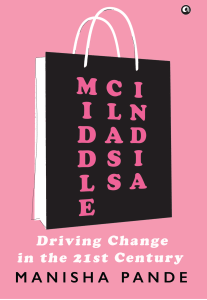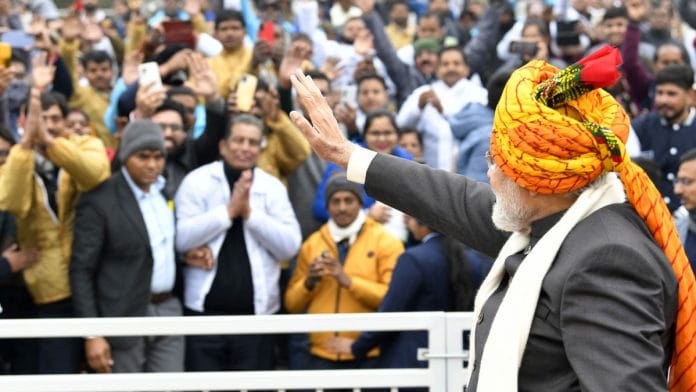The middle class has acted as an agent of political change in India. The first instance of this was when they provided leadership to the national movement and drove the agenda of independence. Since then, it has, time and again, directed the political discourse in the country and has fought for issues impacting not only its own interests, but those of the working classes too. It could be a local matter or a national issue, the middle-class opinion is expressed vociferously and freely.
Over the past few decades, however, the middle class seems to have withdrawn from political processes in India, to the extent that even their participation in the electoral process is minimal. Though the Indian middle class is highly critical of the system, politicians, and politics, it is the least active when it comes to casting votes. In the 2019 general elections in Odisha’s Bhubaneswar, the voter turnout was 46 per cent, out of which only 10 per cent were from the middle class. Those who do vote are more attracted by the charismatic appeal of Prime Minister Modi than the issues plaguing society.
Sabyasachi Basu Ray Chaudhury, professor of political science presents an interesting perspective as to why the middle class is attracted to the Hindutva ideology of the BJP. He believes that neoliberalism is interlinked with the rise of Hindutva, and that the neoliberal economy has, in fact, ‘created more space for Hindutva’. At the core of this observation is the Gujarat model of development brought about by Modi, wherein the middle class, the elite, and the dominant upper castes have been the beneficiaries. Chaudhury maintains that the middle class of today has ‘found in militant nationalism a new self-esteem’.
Today, a discussion on politics can lead to mental harassment, broken relationships and, in some cases, even physical violence against those taking an anti-government stance. Trolling and doxing on social media are a classic example of that.
‘I have quit my school’s WhatsApp group. Every time I criticized the present government over rising prices or unemployment or intolerance, I was called an anti-national by a certain person who has been a US green card holder for the past several years,’ laments Rama Iyer, a homemaker living in Mumbai. Born and raised in Mumbai, Rama, a computer engineer who volunteers as a teacher in an NGO, reminisces about her college days when she could discuss politics and religion without the fear of being called an anti-national. She has a simple question for the ‘person’: if he cares that much about the country, why doesn’t he come back and contribute to the GDP?
She has a point.
Also read: Why India is the world’s most unequal rising power
So, then the question is, at a time when a single statement can create havoc in one’s life, how safe is it to discuss or reflect upon today’s politics and politicians? For that is one of the prime roles of the middle class, to critique the government on its policies and decisions, and to help keep democracy intact. Citizenship comes with rights and duties. The middle class is very conscious of its rights but how aware it is of its responsibilities needs to be explored.
‘Of course, we all looked forward to democracy after Independence,’ says Habib, ‘but the universal adult franchise comes with a responsibility because using your vote with responsibility is a major challenge. In today’s India, though we talk of these rights, how to use them is a big question.
If you are an aware citizen, a citizen who knows, particularly from the middle class, how to use this franchise, then there is no problem. But today, majority of people are not even aware of those rights. That’s why the voting percentage goes hardly beyond 50. You are not aware that as a citizen you have a duty to go and vote. Vote for anyone you like, but you have to be a participant in the process.’ He believes this is where the middle class has the maximum responsibility owing to their large and growing population. ‘And they affect the politics of the country this way or that way. So, they play a major role.’
The fact that the responsibility of taking the country forward lies with the middle class has been made amply clear in the past too. Modern education in India is the best example of the social change brought about by the middle-class intelligentsia. Upper class dominates economically, politically, and socially. Hence, it has no incentive to bring about any change on these fronts.
On the other hand, the lower classes are economically and socially not equipped to fight for their rights. The upper class exhibits power which gives it an edge over the other two classes. Power reduces justice and is a threat to democracy, which makes the political activism of the middle class crucial as it demands greater political accountability. It was this activism that made freedom a reality and gave equal voting rights to women.
In the present Indian scenario, however, one finds the middle class increasingly following the politics of majoritarianism. Politically, the middle class is divided on the issues of identity and nationalism. Each social group has its own definition of nationalism, which differs from the others, leading to rising intolerance in society. Mudgal holds the view that ‘the combination of nationalism and some form of religious fundamentalism and populism and autocracy’ can be seen in many countries around the world.
 This excerpt from ‘Middle Class India: Driving Change in the 21st Century’ by Manisha Pande has been published with permission from Aleph Book Company.
This excerpt from ‘Middle Class India: Driving Change in the 21st Century’ by Manisha Pande has been published with permission from Aleph Book Company.







The author is not only taking a blinkered view but the thought process too suffers from a myopia. A democracy is supposed to address the concerns of minorities and the majority simultaneously. Though Hindus are in majority india can never turn majoritarian precisely because Hinduism or Hindutva is not exclusivity.And remember discarding appeasement does not amount to majoritarianism. Even RSS has said multiple times from different platforms that Indians may pursue different path to God but our ancestors were same. So please do your home work.
Since the last 3-4 years, majority of the Indian Middle Class people don’t go to polling booths to cast their votes. They’re fed up seeing the systematic organized corruptions initiated by political class and administration, and their line of favoring big corporations in expense of the interests of the common people. .That’s why vote percentage has been drastically gone down in urban areas..
Note- The picture published with this article most probably is showing those people who are the official supporters of BJP itself, they’re not the floating voters of middle class
Stunningly baseless article. Zero cross verifiable statements. Zero data backing. Ideally, any article needs to be based on references of objective data from trusted non-partisan sources. This person doesn’t even bother to think on verifiable opinions.